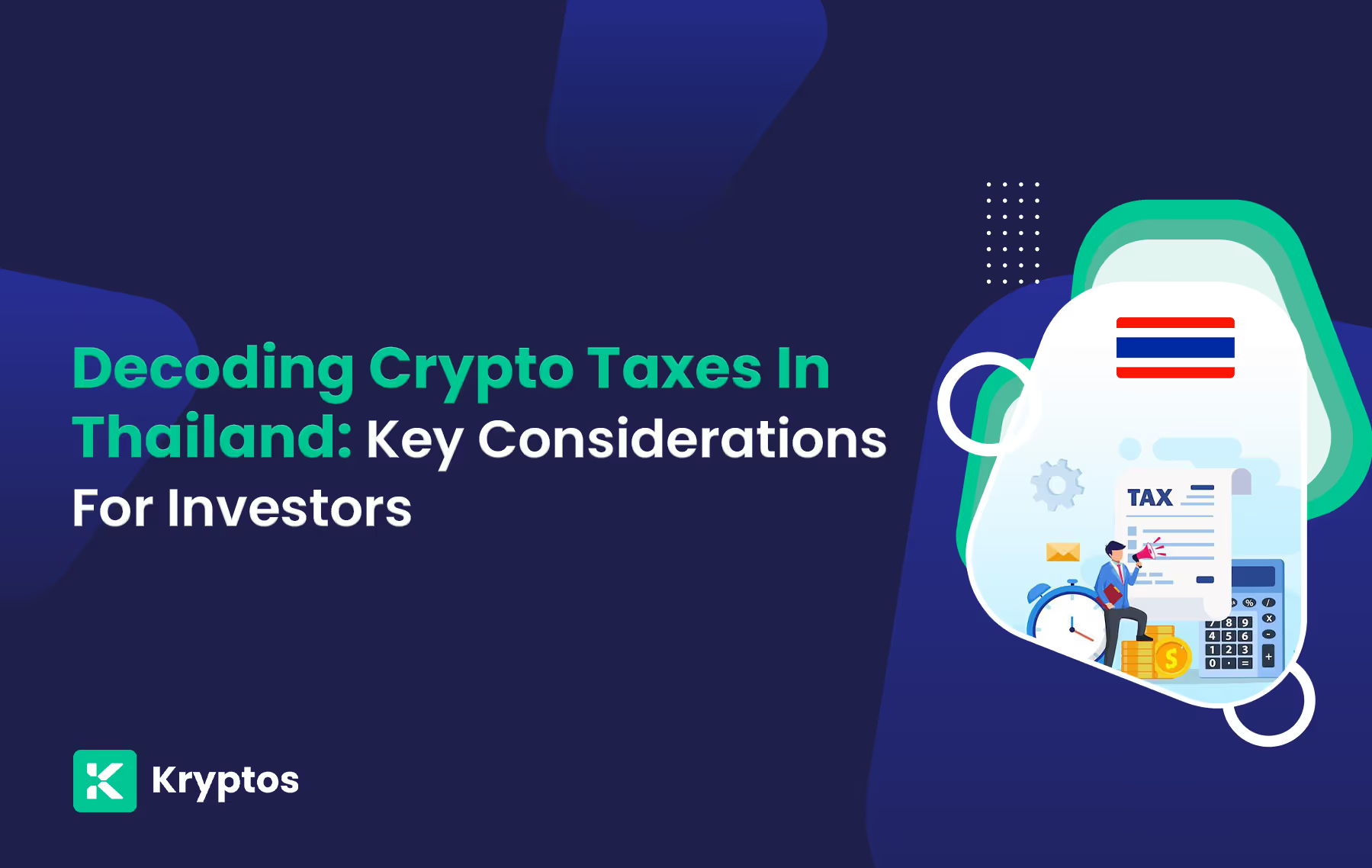.avif)
Calculate Your Crypto
Taxes in Minutes

The evolving landscape of cryptocurrency taxation in Thailand has been a topic of interest and concern for investors, both local and international. As the digital currency market grows, understanding the nuances of crypto taxation becomes essential for anyone looking to invest or currently holding digital assets in Thailand.
Let’s break down the complexities surrounding crypto taxes in Thailand, offering key considerations and guidance for investors.
Understanding Thailand's Crypto Taxation Framework
Navigating the taxation landscape of cryptocurrencies in Thailand requires a deep understanding of how taxable income is calculated and categorized. With the rise of digital currencies as a popular investment choice, the Thai Revenue Department has developed specific guidelines to manage the taxation of such assets. Read on to gain clarity on these guidelines and make informed decisions regarding your cryptocurrency transactions.
Calculating Taxable Income
Capital Gains Tax: In January 2022, the Thai government imposed a 15% capital gains tax on profits derived from cryptocurrency trading.
This is determined by calculating the profit or loss made from the sale or exchange of digital assets. Thailand employs two methods for this calculation:
- First In First Out (FIFO): This method assumes that the first assets purchased are also the first to be sold or exchanged.
- Moving Average Cost (MAC): This method calculates the average cost of all units of a particular asset and uses this average to determine gains or losses.
Important: In an FY, you can use only one of these accounting methods to calculate taxes on all your transactions. If you wish to change your accounting method, you can do so only in the next FY.
Income Tax: Taxation is based on the income generated from various types of transactions involving digital assets. This encompasses a broad spectrum of activities in the crypto space. Income tax is also applicable to income earned from loan interest or as staking rewards. It is an important consideration for those engaged in crypto lending or staking activities. Moreover, an interest income tax is levied on income earned from loan interests or staking rewards. It is an important consideration for those engaged in crypto lending or staking activities.
Taxable Income Categories
The Thai tax system categorizes crypto-related income into several distinct groups:
Trading: This includes income derived from the sale, exchange, transfer, or disposal of digital assets. Whether it's trading on an exchange or peer-to-peer transactions, these activities fall under this category.
Mining: Interestingly, mining activities are not considered assessable income until the mined digital asset is traded or exchanged. This distinction is crucial for crypto miners.
Remuneration: This category covers income earned from employment, self-employment, or work-related activities paid in cryptocurrencies.
Gift: Taxation also applies to awards, gifts, prizes, and cash equivalents received in the form of digital assets.
Return on Investment: Profits or returns from digital asset investments are also subject to taxation under this category.
Reporting and Compliance
Record-Keeping
Investors need to be diligent in their record-keeping practices. This includes maintaining detailed logs of all crypto transactions, including dates, amounts, and the nature of each transaction. These records are crucial for accurate tax reporting & savings.
- If you already pay the 15% capital gains tax for the profits you earn from your crypto investment with the proof of payment provided to you, you can submit the document for tax refunds.
- If in a particular year, your net income from the crypto investment is calculated as a loss, you cannot carry over such losses and include them in your cost calculation in the following year.
Annual Tax Filing
Crypto investors are required to report their gains and losses as part of their annual tax filings. Failure to report accurately can lead to penalties. It's advisable to consult with a tax professional, especially for those with significant or complicated crypto holdings.
The information and documents that you need to keep handy :
- Amount of tokens bought or sold
- Price of each type of cryptocurrencies/digital tokens on each transaction date
- Exchange rate references
- Details of buyers/sellers for your cryptocurrency/digital token buy/sell orders (if any)
- Tax invoices or expense receipts
- Withholding tax certificate (if any)
Tax Planning Strategies
Utilizing Tax Loss Harvesting
Investors can use tax loss harvesting strategies to offset annual losses against gains made in the same financial year. This can reduce the overall tax burden and is a common practice in investment tax planning.
Seeking Professional Advice
Given the complexities and evolving nature of crypto taxation, seeking advice from tax professionals who are well-versed in cryptocurrency regulations is highly recommended. They can provide tailored advice based on individual investment profiles.
Want to simplify your crypto tax journey? Sign Up for Kryptos and get started for free.
Future Outlook and Regulatory Changes
The Thai government has shown a progressive stance towards cryptocurrencies, but regulations are still evolving. Investors should stay informed about any regulatory changes that might impact their tax obligations.
In March 2022, the government announced an exemption from the mandatory 7% VAT on authorized exchanges till the end of December 2023.
Additionally, tax exemptions of up to a decade are offered to investors who commit to investing in crypto startups in the country for a minimum of two years.
In addition to that, beginning on January 1, 2024, authorities will be able to tax foreign income of individuals in 2026.
Thailand's recent moves in the crypto taxation space are a testament to the growing significance of digital currencies in the global financial landscape. As the Thai government seeks to strike a balance between fostering innovation and ensuring fiscal responsibility, it will be interesting to see how these new regulations impact the country's crypto ecosystem in the coming years.
Conclusion
Navigating the world of crypto taxes in Thailand requires a clear understanding of the current tax laws and diligent financial record-keeping. While the crypto landscape is favourable for investors, with a reasonable CGT rate, investors must remain vigilant about compliance and reporting. As the market and regulations continue to evolve, staying informed and seeking professional advice will be key to successfully managing crypto investments in Thailand.
In summary, while the Thai government's approach to crypto taxation offers opportunities for investors, it also demands a high level of responsibility and awareness. By understanding and adhering to these regulations, investors can confidently participate in Thailand's growing digital currency market.
| Step | Form | Purpose | Action |
|---|---|---|---|
| 1 | 1099-DA | Reports digital asset sales or exchanges | Use to fill out Form 8949. |
| 2 | Form 1099-MISC | Reports miscellaneous crypto income | Use to fill out Schedule 1 or C. |
| 3 | Form 8949 | Details individual transactions | List each transaction here. |
| 4 | Schedule D | Summarizes capital gains/losses | Transfer totals from Form 8949. |
| 5 | Schedule 1 | Reports miscellaneous income | Include miscellaneous income (if not self-employment). |
| 6 | Schedule C | Reports self-employment income | Include self-employment income and expenses. |
| 7 | Form W-2 | Reports wages (if paid in Bitcoin) | Include wages in total income. |
| 8 | Form 1040 | Primary tax return | Summarize all income, deductions, and tax owed. |
| Date | Event/Requirement |
|---|---|
| January 1, 2025 | Brokers begin tracking and reporting digital asset transactions. |
| February 2026 | Brokers issue Form 1099-DA for the 2025 tax year to taxpayers. |
| April 15, 2026 | Deadline for taxpayers to file their 2025 tax returns with IRS data. |
| Timeline Event | Description |
|---|---|
| Before January 1, 2025 | Taxpayers must identify wallets and accounts containing digital assets and document unused basis. |
| January 1, 2025 | Snapshot date for confirming remaining digital assets in wallets and accounts. |
| March 2025 | Brokers begin issuing Form 1099-DA, reflecting a wallet-specific basis. |
| Before Filing 2025 Tax Returns | Taxpayers must finalize their Safe Harbor Allocation to ensure compliance and avoid penalties. |
| Feature | Use Case Scenario | Technical Details |
|---|---|---|
| Automated Monitoring of Transactions | Alice uses staking on Ethereum 2.0 and yield farming on Uniswap. Kryptos automates tracking of her staking rewards and LP tokens across platforms. | Integrates with Ethereum and Uniswap APIs for real-time tracking and monitoring of transactions. |
| Comprehensive Data Collection | Bob switches between liquidity pools and staking protocols. Kryptos aggregates all transactions, including historical data. | Pulls and consolidates data from multiple sources and supports historical data imports. |
| Advanced Tax Categorization | Carol earns from staking Polkadot and yield farming on Aave. Kryptos categorizes her rewards as ordinary income and investment income. | Uses jurisdiction-specific rules to categorize rewards and guarantee compliance with local tax regulations. |
| Dynamic FMV Calculation | Dave redeems LP tokens for Ethereum and stablecoins. Kryptos calculates the fair market value (FMV) at redemption and during sales. | Updates FMV based on market data and accurately calculates capital gains for transactions. |
| Handling Complex DeFi Transactions | Eve engages in multi-step DeFi transactions. Kryptos tracks value changes and tax implications throughout these processes. | Manages multi-step transactions, including swaps and staking, for comprehensive tax reporting. |
| Real-Time Alerts and Updates | Frank receives alerts on contemporary tax regulations affecting DeFi. Kryptos keeps him updated on relevant changes in tax laws. | Observe regulatory updates and provide real-time alerts about changes in tax regulations. |
| Seamless Tax Reporting Integration | Grace files taxes using TurboTax. Kryptos integrates with TurboTax to import staking and yield farming data easily. | Direct integration with tax software like TurboTax for smooth data import and multi-jurisdictional reporting. |
| Investor Type | Impact of Crypto Tax Updates 2025 |
|---|---|
| Retail Investors | Standardized crypto reporting regulations make tax filing easier, but increased IRS visibility raises the risk of audits. |
| Traders & HFT Users | To ensure crypto tax compliance, the IRS is increasing its scrutiny and requiring precise cost-basis calculations across several exchanges. |
| Defi & Staking Participants | The regulations for reporting crypto transactions for staking rewards, lending, and governance tokens are unclear, and there is a lack of standardization for decentralized platforms. |
| NFT Creators & Buyers | Confusion over crypto capital gains tax in 2025, including the taxation of NFT flips, royalties, and transactions across several blockchains. |
| Crypto Payments & Businesses | Merchants who take Bitcoin, USDC, and other digital assets must track crypto capital gains for each transaction, which increases crypto tax compliance requirements. |
| Event | Consequences | Penalties |
|---|---|---|
| Reporting Failure | The tax authorities can mark uncontrolled revenues and further investigate. | Penalty fines, interest on unpaid taxes and potential fraud fees if they are deliberately occurring. |
| Misreporting CGT | Misreporting CGT Error reporting profits or losses can trigger the IRS audit. | 20% fine on under -ported zodiac signs, as well as tax and interest. |
| Using decentralized exchanges (DEXs) or mixers without records | The IRS can track anonymous transactions and demand documentation. | Possible tax evasion fee and significant fine. |
| Disregarding Bitcoin mining tax liabilities | Mining reward is considered taxable income, and failure of the report can be regarded as tax fraud. | Further tax obligations, punishment and potential legal steps. |
| Foreign crypto holdings: Non-disclosure | Foreign-accepted crypto FATCA may be subject to reporting rules. | Heavy fines (up to $ 10,000 per fracture) or prosecution for intentional non-transport. |
File Your Crypto Tax in Minutes







.avif)
